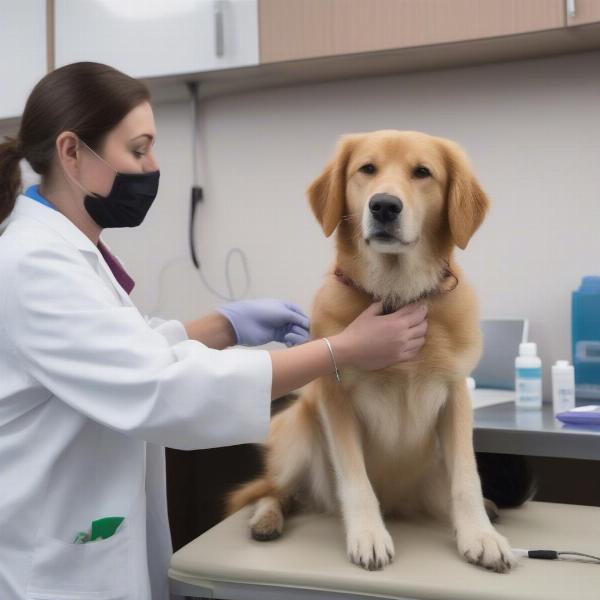Dust mites are a common household allergen, and unfortunately, our canine companions can also suffer from their presence. While dogs aren’t typically infested with dust mites in the same way humans can be with other mite species, they can experience allergic reactions to dust mite waste products. This can lead to a variety of uncomfortable symptoms, affecting your dog’s skin and overall well-being. Understanding the signs, treatment options, and preventative measures can significantly improve your dog’s quality of life.
Recognizing Dust Mite Allergy Symptoms in Dogs
Dust mite allergies manifest differently in dogs than in humans. While we might experience respiratory issues, dogs primarily exhibit skin-related symptoms. These can include:
- Intense itching: This is often the most noticeable sign, with dogs excessively scratching, licking, and chewing at their skin.
- Skin redness and inflammation: Affected areas may appear red, swollen, and irritated.
- Hair loss: Constant scratching and licking can lead to hair loss, particularly around the face, paws, and belly.
- Secondary skin infections: Breaks in the skin from scratching create an entry point for bacteria and yeast, leading to infections.
- Ear infections: Dust mites can also trigger ear inflammation and infections, causing head shaking and ear scratching.
If your dog exhibits any of these symptoms, it’s essential to consult a veterinarian. They can perform tests to determine if dust mites are the culprit and recommend the appropriate course of action.
Diagnosing and Treating Dust Mite Allergies in Dogs
Veterinarians typically use intradermal allergy testing or blood tests to diagnose dust mite allergies in dogs. Once confirmed, several treatment options are available:
- Medications: Antihistamines, corticosteroids, and other medications can help manage itching and inflammation. piriton to dogs
- Immunotherapy: Allergy shots can desensitize your dog to dust mites over time, reducing the severity of allergic reactions. allergy test for dogs
- Topical treatments: Medicated shampoos, sprays, and creams can soothe irritated skin and provide relief. epiphen solution for dogs
 Veterinarian examining a dog for potential allergies
Veterinarian examining a dog for potential allergies
“Effective allergy management often involves a combination of approaches tailored to the individual dog,” says Dr. Emily Carter, DVM, a veterinary dermatologist. “Working closely with your veterinarian is crucial for developing a successful treatment plan.”
Minimizing Dust Mites in Your Home
While completely eradicating dust mites is impossible, reducing their numbers can significantly alleviate your dog’s allergy symptoms. Here are some practical tips:
- Frequent cleaning: Regularly vacuum carpets, rugs, upholstery, and curtains using a HEPA filter vacuum cleaner.
- Wash bedding weekly: Wash your dog’s bedding, as well as any blankets or pillows they use, in hot water (at least 130°F) to kill dust mites.
- Reduce humidity: Dust mites thrive in humid environments. Using a dehumidifier can help keep humidity levels below 50%.
- Air purifiers: Air purifiers with HEPA filters can remove dust mites and other allergens from the air.
- Dust mite covers: Use dust mite-proof covers for mattresses, pillows, and furniture.
How Can I Tell if My Dog Has Dust Mites?
The signs of a dust mite allergy in dogs mimic other allergies, making it difficult to pinpoint the cause without veterinary testing. Look for excessive itching, skin inflammation, hair loss, and secondary infections.
What Home Remedies Can Help My Dog with Dust Mites?
While home remedies can offer temporary relief, they don’t address the underlying allergy. Consult your vet for proper diagnosis and treatment. Regularly bathing your dog with a hypoallergenic shampoo and providing a clean sleeping area can help manage symptoms. itch pills for dogs
Conclusion
Dust mites can significantly impact a dog’s comfort and well-being. Recognizing the signs of dust mite allergy, seeking veterinary diagnosis, and implementing preventative measures are crucial for managing this common issue. By taking proactive steps, you can help your furry friend live a happier, itch-free life.
FAQ
- Can dogs be infested with dust mites? Dogs are not directly infested, but they are allergic to dust mite waste products.
- What are the common signs of dust mite allergy in dogs? Itching, skin inflammation, hair loss, and secondary infections are common signs.
- How is dust mite allergy diagnosed in dogs? Veterinarians use intradermal allergy testing or blood tests for diagnosis.
- What are the treatment options for dust mite allergy in dogs? Medications, immunotherapy, and topical treatments are common options.
- How can I prevent dust mite allergies in my dog? Regular cleaning, washing bedding in hot water, and reducing humidity can help.
- Can I use human antihistamines on my dog? No, consult your vet before giving any medication to your dog.
- Are there any natural remedies for dust mite allergies in dogs? While some natural remedies may offer temporary relief, always consult your vet for proper guidance.
ILM Dog is a leading international pet website dedicated to providing expert advice on dog care and wellbeing. We offer valuable information on various topics, including dog breeds, health, training, nutrition, grooming, and much more. From choosing the right breed to understanding your dog’s health needs, ILM Dog is your one-stop resource for all things canine. Contact us at [email protected] or +44 20-3965-8624 for expert guidance.